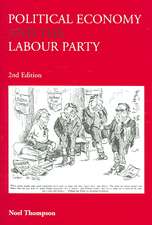Populist Political Communication in Europe: Routledge Research in Communication Studies
Editat de Toril Aalberg, Frank Esser, Carsten Reinemann, Jesper Stromback, Claes De Vreeseen Limba Engleză Hardback – 26 iul 2016
Originating from a research project funded by the European Cooperation in the field of Scientific and Technical Research (COST), this book seeks to advance this research. It includes examinations 24 European countries, and focuses on three areas within the context of populism and populist political communication: populist actors as communicators, the media and populism and citizens and populism.
| Toate formatele și edițiile | Preț | Express |
|---|---|---|
| Paperback (1) | 305.52 lei 6-8 săpt. | |
| Taylor & Francis – iun 2018 | 305.52 lei 6-8 săpt. | |
| Hardback (1) | 1063.41 lei 6-8 săpt. | |
| Taylor & Francis – 26 iul 2016 | 1063.41 lei 6-8 săpt. |
Din seria Routledge Research in Communication Studies
- 11%
 Preț: 305.52 lei
Preț: 305.52 lei -
 Preț: 381.00 lei
Preț: 381.00 lei -
 Preț: 380.07 lei
Preț: 380.07 lei - 23%
 Preț: 257.68 lei
Preț: 257.68 lei - 17%
 Preț: 257.59 lei
Preț: 257.59 lei -
 Preț: 385.62 lei
Preț: 385.62 lei -
 Preț: 392.37 lei
Preț: 392.37 lei - 17%
 Preț: 272.43 lei
Preț: 272.43 lei - 17%
 Preț: 256.76 lei
Preț: 256.76 lei - 17%
 Preț: 259.98 lei
Preț: 259.98 lei -
 Preț: 383.12 lei
Preț: 383.12 lei -
 Preț: 388.26 lei
Preț: 388.26 lei -
 Preț: 385.04 lei
Preț: 385.04 lei -
 Preț: 326.36 lei
Preț: 326.36 lei -
 Preț: 380.25 lei
Preț: 380.25 lei -
 Preț: 383.93 lei
Preț: 383.93 lei - 18%
 Preț: 999.82 lei
Preț: 999.82 lei - 18%
 Preț: 952.77 lei
Preț: 952.77 lei - 9%
 Preț: 937.04 lei
Preț: 937.04 lei - 31%
 Preț: 764.20 lei
Preț: 764.20 lei
Preț: 1063.41 lei
Preț vechi: 1296.84 lei
-18% Nou
Puncte Express: 1595
Preț estimativ în valută:
203.48€ • 221.72$ • 171.46£
203.48€ • 221.72$ • 171.46£
Carte tipărită la comandă
Livrare economică 23 aprilie-07 mai
Preluare comenzi: 021 569.72.76
Specificații
ISBN-13: 9781138654792
ISBN-10: 1138654795
Pagini: 412
Ilustrații: 11
Dimensiuni: 152 x 229 x 25 mm
Greutate: 0.7 kg
Ediția:1
Editura: Taylor & Francis
Colecția Routledge
Seria Routledge Research in Communication Studies
Locul publicării:Oxford, United Kingdom
ISBN-10: 1138654795
Pagini: 412
Ilustrații: 11
Dimensiuni: 152 x 229 x 25 mm
Greutate: 0.7 kg
Ediția:1
Editura: Taylor & Francis
Colecția Routledge
Seria Routledge Research in Communication Studies
Locul publicării:Oxford, United Kingdom
Public țintă
Postgraduate and UndergraduateCuprins
Part 1: Introduction and Conceptual Challenges
1. Introduction: Comprehending Populist Political Communication
[Toril Aalberg and Claes H. de Vreese]
2. Populist Political Communication: Towards a Model of Its Causes, Forms, and Effects
[Carsten Reinemann, Toril Aalberg, Frank Esser, Jesper Strömbäck, and Claes H. de Vreese]
Part II: Populist Political Communications in Northern Europe
3. Denmark: The Rise of the Danish People’s Party
[Christian Martin Bächler and David Nicolas Hopmann]
4. Finland: From Agrarian to Right-Wing Populism
[Ov Cristian Norocel]
5. Norway: Populism From Anti-Tax Movement to Government Party
[Anders R. Jupskås, Elisabeth Ivarsflaten, Bente Kalsnes, and Toril Aalberg]
6. Sweden: No Longer a European Exception
[Jesper Strömbäck, Ann-Cathrine Jungar, and Stefan Dahlberg]
Part III: Populist Political Communications in Western Europe
7. Austria: Candidate-Centered and Anti-Immigrant Right-Wing Populism
[Desirée Schmuck, Jörg Matthes and Hajo Boomgaarden]
8. Belgium: The Rise and Fall of Populism Research
[Benjamin De Cleen and Peter Van Aelst]
9. Germany: Is the Populism Laggard Catching Up?
[Nayla Fawzi, Magdalena Obermaier, and Carsten Reinemann]
10. Ireland: The Rise of Populism on the Left and Among Independents
[Jane Suiter]
11. The Netherlands: A Heartland Full of Insights Into Populist Communication
[Michael Hameleers, Linda Bos, and Claes H. de Vreese]
12. Switzerland: Favourable Conditions for Growing Populism
[Nicole Ernst, Sven Engesser, and Frank Esser]
13. The United Kingdom: Hybrid Populisms, Mixed Fortunes, and Unstable Support
[James Stanyer, Cristina Archetti, and Lone Sorensen]
Part IV: Populist Political Communications in Southern Europe
14. France: The Reluctance to Use the Word Populism as a Concept
[Nicolas Hubé and Naomi Truan]
15. Greece: Populism Between Left and Right
[Stylianos Papathanassopoulos, Iliana Giannouli and Ioannis Andreadis]
16. Israel: Right-Wing Populism and Beyond
[Naama Weiss and Keren Tenenboim-Weinblatt]
17. Italy: A Breeding Ground for Populist Political Communication
[Giuliano Bobba and Guido Legnante]
18. Portugal: Discreet Populisms Amid Unfavorable Contexts and Stigmatization
[Susana Salgado and José Pedro Zúquete]
19. Spain: Populism From the Far Right to the Emergence of Podemos
[Karen B. Sanders, Rosa Berganza, and Roberto de Miguel]
Part V: Populist Political Communications in Eastern Europe
20. Bosnia and Herzegovina: Populism in Transition
[Nedžma Džananović and Mia Karamehić]
21. Croatia: The Rise of Populism on the Path From Communism to European Integration
[Marko Mustapić and Ivan Hrstić]
22. Czech Republic: The Rise of Populism From the Fringes to the Mainstream
[Ondřej Císař and Václav Štětka]
23. Hungary: Home of Empty Populism
[Péter Csigó and Norbert Merkovity]
24. Poland: A Fourth Wave of Populism?
[Agnieszka Stępińska, Artur Lipiński, Agnieszka Hess, and Dorota Piontek]
25. Romania: Populist Ideology Without Teeth
[Nicoleta Corbu, Delia Balaban-Bălaş, and Elena Negrea-Busuioc]
26. Slovenia: Populism as Political Marketing
[Jernej Amon Prodnik and Boris Mance]
Part VI: Conclusions
27. Populist Actors as Communicators or Political Actors as Populist Communicators: Cross-National Findings and Perspectives
[James Stanyer, Susana Salgado, and Jesper Strömbäck]
28. Populism and the Media: Cross-National Findings and Perspectives
[Frank Esser, Agnieszka Stępińska, and David Nicolas Hopmann]
29. Citizens and Populist Political Communication: Cross-National Findings and Perspectives
[Carsten Reinemann, Jörg Matthes, and Tamir Sheafer]
1. Introduction: Comprehending Populist Political Communication
[Toril Aalberg and Claes H. de Vreese]
2. Populist Political Communication: Towards a Model of Its Causes, Forms, and Effects
[Carsten Reinemann, Toril Aalberg, Frank Esser, Jesper Strömbäck, and Claes H. de Vreese]
Part II: Populist Political Communications in Northern Europe
3. Denmark: The Rise of the Danish People’s Party
[Christian Martin Bächler and David Nicolas Hopmann]
4. Finland: From Agrarian to Right-Wing Populism
[Ov Cristian Norocel]
5. Norway: Populism From Anti-Tax Movement to Government Party
[Anders R. Jupskås, Elisabeth Ivarsflaten, Bente Kalsnes, and Toril Aalberg]
6. Sweden: No Longer a European Exception
[Jesper Strömbäck, Ann-Cathrine Jungar, and Stefan Dahlberg]
Part III: Populist Political Communications in Western Europe
7. Austria: Candidate-Centered and Anti-Immigrant Right-Wing Populism
[Desirée Schmuck, Jörg Matthes and Hajo Boomgaarden]
8. Belgium: The Rise and Fall of Populism Research
[Benjamin De Cleen and Peter Van Aelst]
9. Germany: Is the Populism Laggard Catching Up?
[Nayla Fawzi, Magdalena Obermaier, and Carsten Reinemann]
10. Ireland: The Rise of Populism on the Left and Among Independents
[Jane Suiter]
11. The Netherlands: A Heartland Full of Insights Into Populist Communication
[Michael Hameleers, Linda Bos, and Claes H. de Vreese]
12. Switzerland: Favourable Conditions for Growing Populism
[Nicole Ernst, Sven Engesser, and Frank Esser]
13. The United Kingdom: Hybrid Populisms, Mixed Fortunes, and Unstable Support
[James Stanyer, Cristina Archetti, and Lone Sorensen]
Part IV: Populist Political Communications in Southern Europe
14. France: The Reluctance to Use the Word Populism as a Concept
[Nicolas Hubé and Naomi Truan]
15. Greece: Populism Between Left and Right
[Stylianos Papathanassopoulos, Iliana Giannouli and Ioannis Andreadis]
16. Israel: Right-Wing Populism and Beyond
[Naama Weiss and Keren Tenenboim-Weinblatt]
17. Italy: A Breeding Ground for Populist Political Communication
[Giuliano Bobba and Guido Legnante]
18. Portugal: Discreet Populisms Amid Unfavorable Contexts and Stigmatization
[Susana Salgado and José Pedro Zúquete]
19. Spain: Populism From the Far Right to the Emergence of Podemos
[Karen B. Sanders, Rosa Berganza, and Roberto de Miguel]
Part V: Populist Political Communications in Eastern Europe
20. Bosnia and Herzegovina: Populism in Transition
[Nedžma Džananović and Mia Karamehić]
21. Croatia: The Rise of Populism on the Path From Communism to European Integration
[Marko Mustapić and Ivan Hrstić]
22. Czech Republic: The Rise of Populism From the Fringes to the Mainstream
[Ondřej Císař and Václav Štětka]
23. Hungary: Home of Empty Populism
[Péter Csigó and Norbert Merkovity]
24. Poland: A Fourth Wave of Populism?
[Agnieszka Stępińska, Artur Lipiński, Agnieszka Hess, and Dorota Piontek]
25. Romania: Populist Ideology Without Teeth
[Nicoleta Corbu, Delia Balaban-Bălaş, and Elena Negrea-Busuioc]
26. Slovenia: Populism as Political Marketing
[Jernej Amon Prodnik and Boris Mance]
Part VI: Conclusions
27. Populist Actors as Communicators or Political Actors as Populist Communicators: Cross-National Findings and Perspectives
[James Stanyer, Susana Salgado, and Jesper Strömbäck]
28. Populism and the Media: Cross-National Findings and Perspectives
[Frank Esser, Agnieszka Stępińska, and David Nicolas Hopmann]
29. Citizens and Populist Political Communication: Cross-National Findings and Perspectives
[Carsten Reinemann, Jörg Matthes, and Tamir Sheafer]
Recenzii
"Populism, in all its varieties, has become a force across Europe. At last, we have a collection that combines a variety of state-level analyses with an unyielding conceptual rigour. For scholars in Europe and beyond, his collection promises to nourish informed discussion of the populist challenge for years to come" --Michael Higgins, University of Strathclyde, UK
Descriere
Originating from a research project funded by the European Cooperation in the field of Scientific and Technical Research (COST), this book includes examinations 24 European countries, and focuses on three areas within the context of populism and populist political communication: populist actors as communicators, the media and populism and citizens and populism.
















